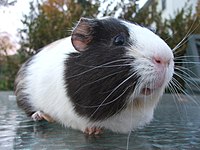
Photo from wikipedia
Although dietary fibers (DFs) have been shown to improve intestinal health in pigs, it is unclear whether this improvement varies according to the type/source of DF. In the current study,… Click to show full abstract
Although dietary fibers (DFs) have been shown to improve intestinal health in pigs, it is unclear whether this improvement varies according to the type/source of DF. In the current study, we investigated the impact of dietary supplement (15%) of pea-hull fiber (PF), oat bran (OB), and their mixture (MIX, PF, and OB each accounted for 7.5%) in the growth performance as well as intestinal barrier and immunity-related indexes in growing pigs. Twenty-four cross-bred pigs (32.42 ± 1.95 kg) were divided into four groups: CON (basal diet with no additional DF), PF, OB, and MIX. After 56 days of feeding, we found that the growth performance of PF pigs was decreased (p < 0.05) compared with pigs in other groups. Results of real-time polymerase chain reaction and Western blot showed that the improvement of immune-related indexes (e.g., interleukin 10 [IL-10]) in OB and MIX pigs mainly presented in the ileum, whereas the improvement of intestinal barrier–related indexes (e.g., MUC1 and MUC2) mainly presented in the colon. Whether in the ileum or colon, such improvement of immune function may be dependent on NOD rather than TLR-associated pathways. Amplicon sequencing results showed that PF and MIX pigs shared a similar bacterial community, such as lower abundance of ileal Clostridiaceae and colonic Streptoccocus than that of CON pigs (p < 0.05). Our results indicate that OB and MIX, rather than PF, benefit the intestinal health in growing pigs, and multiple-sourced DF may reduce the adverse effect of single-soured DF on the growth performance and gut microbiota in pigs.
Journal Title: Frontiers in Microbiology
Year Published: 2022
Link to full text (if available)
Share on Social Media: Sign Up to like & get
recommendations!